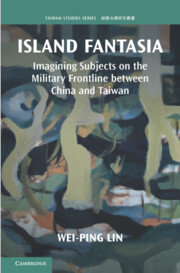
-
- You have access
- Open access
- Cited by 5
-
Cited byCrossref Citations
This Book has been cited by the following publications. This list is generated based on data provided by Crossref.
2021. Books received. The China Quarterly, Vol. 248, Issue. 1, p. 1254.
Ho, Ming-sho 2024. The Palgrave Handbook of Contemporary Geopolitics. p. 1.
Lin, Yen-Lung Tsai, Yu-Hua and Wu, Ping-Sheng 2024. Rescaling the contributed sphere: sociocultural processes in temple reconstruction in Taiwan. Journal of Asian Architecture and Building Engineering, p. 1.
Ho, Ming-sho 2024. The Palgrave Handbook of Contemporary Geopolitics. p. 907.
Huang, Kai-Yang 2025. The Affect of Memory: The Affective Community in the Matsu Borderland Archipelago. Geopolitics, p. 1.
- Publisher:
- Cambridge University Press
- Online publication date:
- September 2021
- Print publication year:
- 2021
- Online ISBN:
- 9781009023481
- Creative Commons:
-
This content is Open Access and distributed under the terms of the Creative Commons Attribution licence CC-BY-NC-ND 4.0 https://creativecommons.org/creativelicenses


